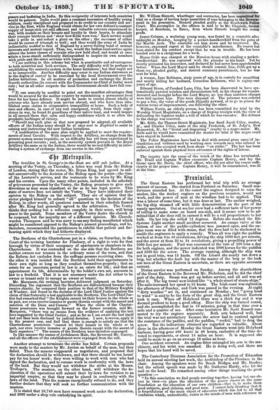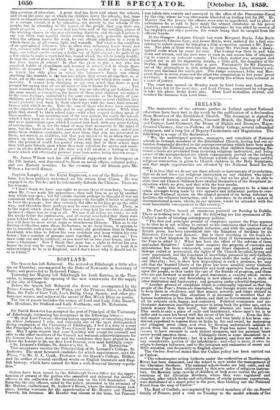Vtuutuctal.
The Great Eastern has performed her trial trip with an average amount of success. She started from Portland on Saturday. Small mis- fortunes attended her. At the outset the engines designed to raise the anchor, like the donkey engines on the previous occasion, would not work, and the power of men at the windlass had to be applied. This was a labour of some time, but it was done at last. The anchor weighed, the big ship steamed off with little demonstration on the part of the scanty spectators. Out at sea her crew had a sufficient taste of her power of rolling to make some on board sea-sick, and it seems now to be ad- mitted that if she does roll in earnest it will be a roll proportionate to her bulk. On her trip she rolled 12 degrees. Before she reached the Ed- dystone Light another small accident occurred. An escape valve at the bottom of one of the paddle-cylinders: was jammed open, and the en- gine room was so filled with steam, that the fires had to be slackened to enable the engineers to apply a remedy. When all was right the paddles worked at from 9 to 10 revolutions, driving the ship 1600 feet per minute, and the screw at from 32 to 34 revolutions, giving a propelling power of 2500 feet per minute. Fuel was consumed at the rate of 250 tons a day for both engines, and the power indicated was 2000 horses for the paddles and 3500 for the screw. The average running, although the ship was not in good trim, was 13 knots. Off the Lizard she nearly ran down a brig, but whether the fault lay with the master of the brig or the look out men of the Great Eastern is uncertain, as there are opposite accounts current.
Divine service was performed on Sunday. Among the shareholders of the Great Eastern is the Reverend Mr. Nicholson, and he did the chief part of the duty. Steam was got up before service and all sail was set after it. The big vessel now looked like "a whole street of steam-ships." The sails increased her speed to 15 knots. The Irish coast was sighted in the afternoon of Sunday, and Cork was passed in the evening. At night "dirty weather" set in, and continued on Monday ; but going head to wind" is said to be the forte of the great ship, and the Great Eastern took it easy. When off Holyhead there was a thick fog and it was deemed prudent to keep a good offing. Here the ship was turned round, and she accomplished the feat in 19 minutes, going in that time over a mile and a quarter of sea. After some hesitation Mr. Scott Russell con- sented to try the engines separately. Both sets behaved well, but the trial was not satisfactory because the screw had to contend against the resistance of the paddles, and the paddles, "reefed," had to drag the screw. But the indications obtained are regarded as valuable. About three in the afternoon of Monday the Great Eastern went into Holyhead harbour, having gone 480 knots in 40 hours, exclusive of the time de- voted to experiments, or about 15 miles an hour. It is supposed she could be made to go on an average 18 miles an hour. One accident occurred. An engine fitter entangled his arm in the ma- chinery, and his wrist was smashed. He is doing well, and there are hopes that his hand will be saved.
The Canterbury Diocesan Association for the Promotion of Education held its annual meeting last week, the Archbishop of the Province in the chair. Among the speakers were Sir Brook Bridges and Mr. Deedes; but the salient speech was made by Mr. Gathorne Hardy, who hit the nail on the head. He remarked among other things touching the great question :— " In this association we find people meeting together, having but one ob- ject in view—to place the education of the poorer classes on the same foundation as the education of our own children—that is, to make them good subjects, good citizens, and good men. I cannot help thinking that it is forgetfulness of the main object of education which has led to all that confusion which, undoubtedly, exists in the minds of men with reference to this question of education. A great deal has been said about the schools, and about the early age at which the children leave the schools ; but, inspe, much as education does not terminate in the schools, but only hegira there to a certain extent, it is by attending, not merely to the school, of the people, but by attending to the homes of the people, that j,m„A Make any great progress A great deal has been said of the dwelling-places of the working classes in the manufacturing districts, and though I grieve to say you often find squalid abodes among them, yet, generally speaking, when the artisan leaves his work, he can obtain admission to a room in which there is, at all events, light and warmth. But what is the condition of an agricultural labourer, who is often seen returning home weary and wet, covered with mud and soil? He goes to a cabin, where he finds, per- haps, one tallow candle casting a feeble ray of light around ; he gathers up a few sticks to make a wretched fire, round which the whole family huddle. Is that the sort of place in which to continne the moral instruction which has been begun at school ? b that the place to put a boy who has acquired habits of cleanliness and decency at school, and to retain those habits of decency ? Haw can he pursue his studies in a dwelling in which the only place in which the labourer's family can obtain anything like warmth is the bed into which they crowd all together, or: at least, all in the same room, in a way which must and which does cause ins- morality. I cannot help thinking, in my own mind, that there is good ground for saying that we are all more or less to blame for this You must remember that these people whom you are educating are fashioned in the same mould as yourselves, the hearts of these poor children are subject to the same feelings, animated by the same emotions as the hearts of your children, and if they were treated in the same manner as your children they would probably look back to their school days with the same fond remem- brance with which we do. Take the case of those who have been educated at the superior class of schools and in our public seminaries. With what pride they revert to their school days—with what respect do they speak of their masters. I am speaking now of the new system, for really the schools which I first went to were very different to the present elementary schools, and were institutions upon which I cannot look back with any great feeling of satisfaction. It is not the mind of man that answereth to the mind of man, but the heart of man that answereth to the heart of man ; and if you make these children confidants, and show them that you are interested in them, not merely as children, but that you intend to be so when_they are grown up into men and women, that you will keep up the acquaintance after the period of youth has passed away, and that in their school days they will gain friends upon whom they may calculate for advice and assist- ance in all the difficulties of life, then you will awaken a feeling in their hearts which will effectually prevent your instruction being thrown away."
Mr. James Wilson met his old political supporters at Devonport on the 7th instant, and discoursed to them on naval affairs, colonial policy, and our Eastern troubles. In the evening his old friends gave Mr. Wilson a farewell dinner.
Captain Longley, of the Royal Engineers, a son of the Bishop of Dur- ham, has been publicly welcomed on his return from China. He was engaged in the Pei-ho, and he vehemently defends the Chinese. These are his reasons.
"I don't think we have any right to accuse them of treachery, because, -when Mr. Bruce made his appearance, they told him to go up by another way which was open ; but for certain reasons perhaps he thought A was not consistent with the honour of this country—he thought it better to attempt to force the passage ; but they certainly did offer to let him go up the other way, and therefore there perhaps may be sonic excuse for them. Then, as to the report which stated that there was a trap laid for us—this is entirely incorrect—there was no trap at all. We saw it all before we went ; we saw tho masks before the embrasures, and of course concluded that there were guns behind them, and we saw the mud we had to cross. Therefore I hope you will hear no more about traps or treacherous Chinese. Then as to our forcing civilization upon these barbarians, as we term them, it appears to me to resemble such a case as this. A crusty old gentleman lives in Bishop Auckland, who likes to follow his own crotchets and keep within his own house ; but a number of persons meet together, go to him, and say, You must come out and be civilized ; or you must let us into your house, and be- come a Christian.' Now I think that man has a right to defend his own house the best way he can; every man's house is his castle, at least it is acknowledged to be so in England, and I don't know why it should not be so in China."



























 Previous page
Previous page